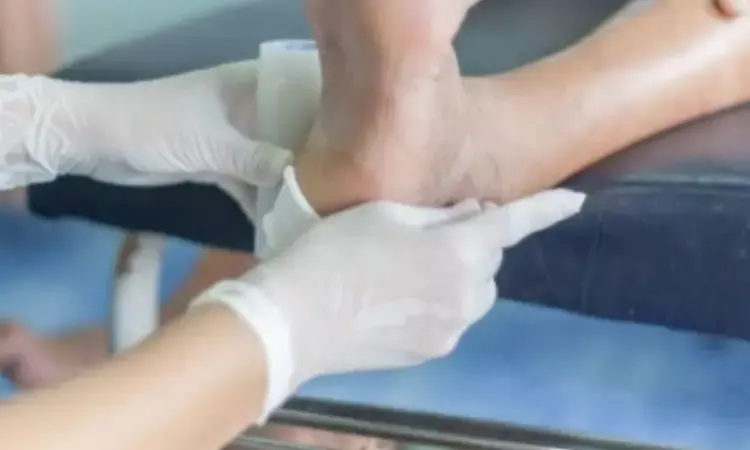- Home
- Medical news & Guidelines
- Anesthesiology
- Cardiology and CTVS
- Critical Care
- Dentistry
- Dermatology
- Diabetes and Endocrinology
- ENT
- Gastroenterology
- Medicine
- Nephrology
- Neurology
- Obstretics-Gynaecology
- Oncology
- Ophthalmology
- Orthopaedics
- Pediatrics-Neonatology
- Psychiatry
- Pulmonology
- Radiology
- Surgery
- Urology
- Laboratory Medicine
- Diet
- Nursing
- Paramedical
- Physiotherapy
- Health news
- Fact Check
- Bone Health Fact Check
- Brain Health Fact Check
- Cancer Related Fact Check
- Child Care Fact Check
- Dental and oral health fact check
- Diabetes and metabolic health fact check
- Diet and Nutrition Fact Check
- Eye and ENT Care Fact Check
- Fitness fact check
- Gut health fact check
- Heart health fact check
- Kidney health fact check
- Medical education fact check
- Men's health fact check
- Respiratory fact check
- Skin and hair care fact check
- Vaccine and Immunization fact check
- Women's health fact check
- AYUSH
- State News
- Andaman and Nicobar Islands
- Andhra Pradesh
- Arunachal Pradesh
- Assam
- Bihar
- Chandigarh
- Chattisgarh
- Dadra and Nagar Haveli
- Daman and Diu
- Delhi
- Goa
- Gujarat
- Haryana
- Himachal Pradesh
- Jammu & Kashmir
- Jharkhand
- Karnataka
- Kerala
- Ladakh
- Lakshadweep
- Madhya Pradesh
- Maharashtra
- Manipur
- Meghalaya
- Mizoram
- Nagaland
- Odisha
- Puducherry
- Punjab
- Rajasthan
- Sikkim
- Tamil Nadu
- Telangana
- Tripura
- Uttar Pradesh
- Uttrakhand
- West Bengal
- Medical Education
- Industry
Patients of diabetic foot ulcer have greater odds of dying than undergoing amputation: Study

According to a new study conducted by Rosemary C. Chamberlain and colleagues, death is a greater risk than amputation among diabetes patients. The patients with either type 1 or type 2 diabetes who also had a history of foot ulcer had greater odds of dying than undergoing amputation during a six-year follow-up period, find researchers.
The findings of this study were published in the American Diabetes Association, in the month of December, 2021.
The primary goal of this study was to describe the incidence of foot ulceration and amputation-free survival in a national population-based cohort study of people with diabetes. In the following study the population included 233,459 were diabetics living in Scotland on January 1, 2012, as identified by the national population-based register (national prevalence 4.9 percent ). The characteristics of patients identified from linked hospital and mortality records were compared by outcome during the follow-up period until the end of November 2017. The Cox regression method was used to examine the relationship between a history of foot ulcers and amputation-free survival.
Key findings of this study were:
There were 23,395 people with type 1 diabetes and 210,064 people with type 2 diabetes in the population.
There were 13,093 (5.6%) people who had a previous foot ulceration, 9,023 who developed their first ulcer, 48,995 who died, and 2,866 who underwent minor or major amputation during the follow-up period. -
The overall incidence of first-time foot ulcers was 7.8 per 1,000 person-years (95% CI7.6–7.9), and the overall incidence of any ulcer was 11.2 (11.0–11.4).
In addition to traditional cardiovascular risk factors, social deprivation, mental illness, and being underweight were risk factors for reduced amputation-free survival.
The adjusted hazard ratios (95 percent CI) for type 1 diabetes were 2.09 (1.89–2.31) and 1.65 (1.60–1.70) for type 2 diabetes.
In conclusion, according to Leese, intervention studies are needed to show that targeted interventions for people with diabetes and previous ulcers can be beneficial, especially for those who live in a socially deprived area or have mental illness.
Reference:
Chamberlain, R. C., Fleetwood, K., Wild, S. H., Colhoun, H. M., Lindsay, R. S., Petrie, J. R., McCrimmon, R. J., Gibb, F., Philip, S., Sattar, N., Kennon, B., & Leese, G. P. (2021). Foot Ulcer and Risk of Lower Limb Amputation or Death in People With Diabetes: A National Population-Based Retrospective Cohort Study. In Diabetes Care (p. dc211596). American Diabetes Association. https://doi.org/10.2337/dc21-1596
Medical Dialogues consists of a team of passionate medical/scientific writers, led by doctors and healthcare researchers. Our team efforts to bring you updated and timely news about the important happenings of the medical and healthcare sector. Our editorial team can be reached at editorial@medicaldialogues.in.
Dr Kamal Kant Kohli-MBBS, DTCD- a chest specialist with more than 30 years of practice and a flair for writing clinical articles, Dr Kamal Kant Kohli joined Medical Dialogues as a Chief Editor of Medical News. Besides writing articles, as an editor, he proofreads and verifies all the medical content published on Medical Dialogues including those coming from journals, studies,medical conferences,guidelines etc. Email: drkohli@medicaldialogues.in. Contact no. 011-43720751


